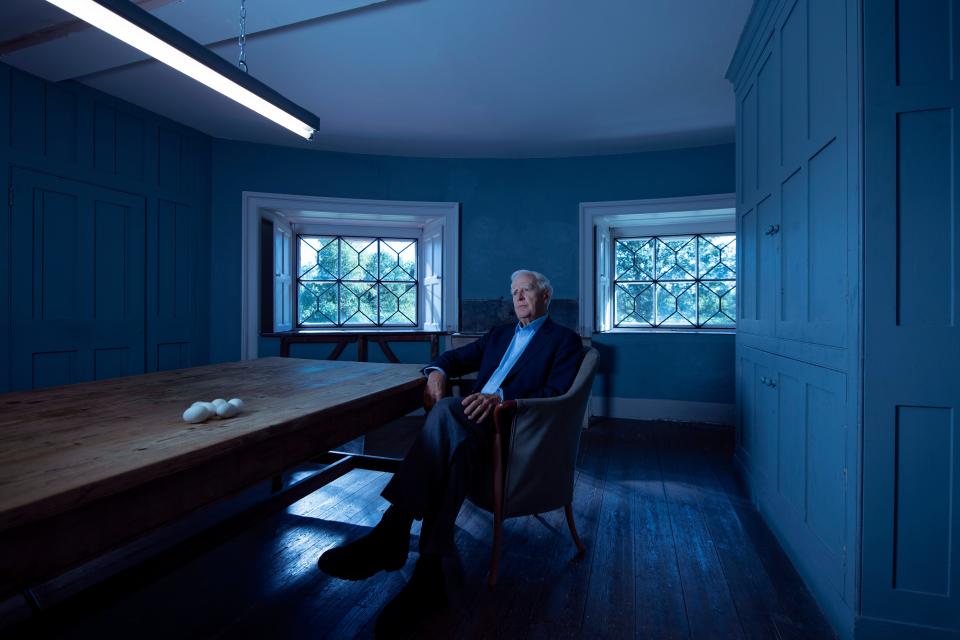Novelist John le Carré shares seedy stories from a mysterious life in 'The Pigeon Tunnel'
- Oops!Something went wrong.Please try again later.
- Oops!Something went wrong.Please try again later.
You never know just what you’ll get with an Errol Morris documentary, but you can be pretty sure it’ll be interesting.
That’s certainly the case with “The Pigeon Tunnel,” Morris’ extended interview with David Cornwell, the novelist better known as John le Carré. LeCarré died in 2020, but not before talking to Morris about his life, or at least the parts that he was willing to discuss, and to a more limited extent his work.
But as much as anything it’s an examination of what an interview is, what it means, what it accomplishes.
Thus, it’s classic Morris — not what you expect, maybe, but something just as good or better.
'Always good to be back': After 42 years, Ron Hoon absences cause a stir
Interviews are odd to begin with. Errol Morris' are especially so
Interviews are an inherently odd transaction. And a transaction is exactly what they are — both sides get something out of it. Although in this case it’s not necessarily as straightforward as all that.
In fact in some cases they swap roles, with Cornwell asking Morris why he’s doing the interview, what he wants to learn, both about Cornwell and himself. Morris thinks out loud often during his films, and he doesn’t shy away from his inability to express exactly what that is.
Of course they also talk about Cornwell’s life, and what a life it was.
His father was a huckster, a con artist who spent time in prison, a man for whom life was a performance. “Of truth, we didn’t speak,” Cornwell intones in his rich British accent. “Of conviction, we didn’t speak.”

Cornwell wound up at Oxford, spent time as a teacher and then became a spy. He was already used to independence, and playing at being someone he wasn’t. The betrayals of double agents like the infamous Kim Philby weren’t so shocking to him as they were expected, even appealing.
Eventually, he channeled all this into his first novel, “The Spy Who Came in from the Cold.”
Listening to two people talk isn’t in and of itself interesting — unless they’re interesting. Both Cornwell and Morris are, and seem to feed off of each other. It certainly doesn’t hurt that Cornwell is a brilliant storyteller, whose tales of misadventure when he was younger sound like something out of, well, a novel.
And that voice! It’s the perfect mix of diction and delivery, used in service of wildly entertaining stories about all manner of seedy things.
Cornwell didn't bare all
Not too seedy, though. At one point Morris says people are giving him a hard time about not going in deep enough with his questioning about betrayal, whether in Cornwell's professional or, more importantly, personal life. Cornwell disagrees.
“Well, I feel that you’ve got the last drop out of the sponge on that subject,” he says. “But I’ll answer any question you wish me to answer, as truthfully as I can.”
Perhaps people want him to break down and sob, Morris suggests.
“I can do that, like I can do bird noises,” Cornwell says.
Thus he waves away the things he doesn’t want to do during the interview.
Absolutely off limits: his sex life. He talks about being well off — in the context of paying for other people’s funerals — but doesn’t go into detail. All of this is genial, gentlemanly, even.
The title image is central to John le Carré's life and work
Morris uses reenactments, clips from movies based on the novels, talk-show appearances to bolster the interview sessions. By the end we know more about Cornwell in a biographical sense. What we really know about him as a person is less clear.
For instance the title, which Cornwell says has at some point been the working title for all of his novels, comes from a recollection from his childhood. His father took him to a shooting club, underneath which were parallel tunnels. Pigeons that had been trapped or bred on the roof of the place were forced through the tunnels. When they broke free they were promptly shot by the club members. The ones that avoided their grisly fate didn’t escape. They flew back to the roof, back to the cages that entraped them.
It’s a memory that haunted him ever since, Cornwell says. Why?
“Quite why this image has haunted me for so long is something the listener is perhaps better able to judge than I am,” he says.
Perhaps. Or perhaps not. This is, after all, a man who has steeped in mystery all his life, both real and imagined.
'The Pigeon Tunnel' 4 stars
Great ★★★★★ Good ★★★★
Fair ★★★ Bad ★★ Bomb ★
Director: Errol Morris.
Cast: David Cornwell.
Rating: PG-13 for some violence, smoking and brief language.
How to watch: In theaters and streaming on Apple TV+ on Friday, Oct. 20.
Reach Goodykoontz at bill.goodykoontz@arizonarepublic.com. Facebook: facebook.com/GoodyOnFilm. X, formerly known as Twitter: @goodyk.
Subscribe to azcentral.com today. What are you waiting for?
This article originally appeared on Arizona Republic: Who was John le Carré? 'The Pigeon Tunnel' gallantly tries to find out

